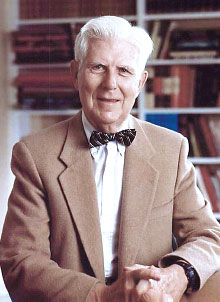Aaron Beck, M.D., Founder of CBT, Dies at 100
Abstract
APA leaders hailed the legacy of a psychiatrist who developed a model of psychotherapy now used the world over.

Aaron Beck, M.D., the founder of cognitive-behavior therapy, died November 1.
Aaron Temkin Beck, M.D., the father of cognitive-behavior therapy (CBT), died last month at his home in Philadelphia. He was 100 years old.
Known to friends as “Tim,” Beck had a profound influence on the practice of psychotherapy. The CBT therapy he developed using a standardized approach that focused on how thoughts fostered feelings and influenced behavior is practiced the world over. Countless research papers have been published over the years looking at the effectiveness of CBT for a range of psychiatric disorders.
Beck was steeped in classical psychoanalytic theory and practice, but CBT marked a departure for how patients experienced psychotherapy.
“Cognitive-behavior therapies represent a class of pragmatic approaches to understanding and treating psychiatric disorders and problems,” according to the Oxford Textbook of Psychotherapy, co-edited by Beck’s daughter, Judith Beck, Ph.D., along with Glen Gabbard, M.D., and Jeremy Holmes, M.D. “Although there is much diversity among these treatments, interventions are characteristically problem focused, goal directed, future oriented, time limited, and empirically based. Cognitive-behavior therapies assume that cognitive and emotional processes mediate the acquisition and maintenance of psychopathology. Accordingly, interventions effect change in symptoms, behavior, and functioning via changes in cognition.”
The Beck Institute for Cognitive Behavior Therapy has created a memorial webpage for Beck. “My father dedicated his life to the development and testing of treatments to improve the lives of countless people throughout the world facing health and mental health challenges,” wrote Judith Beck, the president of the institute, in a statement on the page. “He truly transformed the field of mental health with his development of and decades of research in cognitive behavior therapy.
“My father and I co-founded the Beck Institute for Cognitive Behavior Therapy to provide training to CBT practitioners worldwide. Our dream was to create an institution that would allow CBT to evolve and thrive. We’ve succeeded beyond our expectations. We now honor my father’s legacy as we continue his work and further his mission of helping individuals live healthier, happier, and more meaningful lives.”
APA leaders were united in hailing Beck’s legacy. “The impact Aaron Beck has had on psychiatry and psychotherapy cannot be overstated,” said APA President Vivian B. Pender, M.D. “His innovation in therapy—which seemed at first like a radical departure—is surely now one of the most commonly practiced forms of psychotherapy, and it has been proven effective in hundreds of studies. Cognitive-behavior therapy will continue to help patients recover from psychiatric disorders and return to productive and satisfying lives. We mourn Aaron Beck’s passing and wish for peace for his surviving family.”
Immediate past APA President Jeffrey Geller, M.D., M.P.H., knew Beck when Geller was a medical student and then again in later years. “Few people know that Tim started his career working with patients with schizophrenia, and he returned to that work in his later years,” Geller told Psychiatric News. “He was brilliant, always neat and trim and wearing his characteristic bow tie. He seemed somewhat stern then, but I got to know him in later years as an incredibly sweet man.
“He made tremendous contributions to the field of psychiatry, and his loss is greatly mourned.”
APA CEO and Medical Director Saul Levin, M.D., M.P.A., agreed. “Aaron Beck was one of the giants of this generation of psychiatrists,” he said. “His influence on the practice of psychotherapy and on understanding psychiatric disorders is enormous. Psychiatry and APA are indebted to Dr. Beck for providing psychiatrists with an innovative tool for helping their patients recover from psychiatric illness. We are deeply saddened by his loss and offer our condolences to his family.” ■
The institute’s Aaron Beck Memorial page is posted here.



